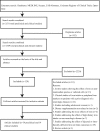Impact of high iron intake on cognition and neurodegeneration in humans and in animal models: a systematic review
- PMID: 28505363
- PMCID: PMC5914328
- DOI: 10.1093/nutrit/nux015
Impact of high iron intake on cognition and neurodegeneration in humans and in animal models: a systematic review
Abstract
Context: Accumulation of brain iron is linked to aging and protein-misfolding neurodegenerative diseases. High iron intake may influence important brain health outcomes in later life.
Objective: The aim of this systematic review was to examine evidence from animal and human studies of the effects of high iron intake or peripheral iron status on adult cognition, brain aging, and neurodegeneration.
Data sources: MEDLINE, Scopus, CAB Abstracts, the Cochrane Central Register of Clinical Trials, and OpenGrey databases were searched.
Study selection: Studies investigating the effect of elevated iron intake at all postnatal life stages in mammalian models and humans on measures of adult brain health were included.
Data extraction: Data were extracted and evaluated by two authors independently, with discrepancies resolved by discussion. Neurodegenerative disease diagnosis and/or behavioral/cognitive, biochemical, and brain morphologic findings were used to study the effects of iron intake or peripheral iron status on brain health. Risk of bias was assessed for animal and human studies. PRISMA guidelines for reporting systematic reviews were followed.
Results: Thirty-four preclinical and 14 clinical studies were identified from database searches. Thirty-three preclinical studies provided evidence supporting an adverse effect of nutritionally relevant high iron intake in neonates on brain-health-related outcomes in adults. Human studies varied considerably in design, quality, and findings; none investigated the effects of high iron intake in neonates/infants.
Conclusions: Human studies are needed to verify whether dietary iron intake levels used in neonates/infants to prevent iron deficiency have effects on brain aging and neurodegenerative disease outcomes.
Keywords: brain aging; iron nutrition; iron supplementation; protein-misfolding neurodegenerative diseases.
© The Author(s) 2017. Published by Oxford University Press on behalf of the International Life Sciences Institute.
Figures
Similar articles
-
Fortification of salt with iron and iodine versus fortification of salt with iodine alone for improving iron and iodine status.Cochrane Database Syst Rev. 2022 Apr 21;4(4):CD013463. doi: 10.1002/14651858.CD013463.pub2. Cochrane Database Syst Rev. 2022. PMID: 35446435 Free PMC article.
-
Systemic pharmacological treatments for chronic plaque psoriasis: a network meta-analysis.Cochrane Database Syst Rev. 2021 Apr 19;4(4):CD011535. doi: 10.1002/14651858.CD011535.pub4. Cochrane Database Syst Rev. 2021. Update in: Cochrane Database Syst Rev. 2022 May 23;5:CD011535. doi: 10.1002/14651858.CD011535.pub5. PMID: 33871055 Free PMC article. Updated.
-
Eliciting adverse effects data from participants in clinical trials.Cochrane Database Syst Rev. 2018 Jan 16;1(1):MR000039. doi: 10.1002/14651858.MR000039.pub2. Cochrane Database Syst Rev. 2018. PMID: 29372930 Free PMC article.
-
Drugs for preventing postoperative nausea and vomiting in adults after general anaesthesia: a network meta-analysis.Cochrane Database Syst Rev. 2020 Oct 19;10(10):CD012859. doi: 10.1002/14651858.CD012859.pub2. Cochrane Database Syst Rev. 2020. PMID: 33075160 Free PMC article.
-
Multiple-micronutrient supplementation for women during pregnancy.Cochrane Database Syst Rev. 2017 Apr 13;4(4):CD004905. doi: 10.1002/14651858.CD004905.pub5. Cochrane Database Syst Rev. 2017. Update in: Cochrane Database Syst Rev. 2019 Mar 14;3:CD004905. doi: 10.1002/14651858.CD004905.pub6. PMID: 28407219 Free PMC article. Updated.
Cited by
-
Multilevel Impacts of Iron in the Brain: The Cross Talk between Neurophysiological Mechanisms, Cognition, and Social Behavior.Pharmaceuticals (Basel). 2019 Aug 29;12(3):126. doi: 10.3390/ph12030126. Pharmaceuticals (Basel). 2019. PMID: 31470556 Free PMC article. Review.
-
Iron Supplementation during Pregnancy and Infancy: Uncertainties and Implications for Research and Policy.Nutrients. 2017 Dec 6;9(12):1327. doi: 10.3390/nu9121327. Nutrients. 2017. PMID: 29210994 Free PMC article. Review.
-
Toxicity and infectivity: insights from de novo prion formation.Curr Genet. 2018 Feb;64(1):117-123. doi: 10.1007/s00294-017-0736-1. Epub 2017 Aug 30. Curr Genet. 2018. PMID: 28856415 Free PMC article. Review.
-
Trace Elements in Alzheimer's Disease and Dementia: The Current State of Knowledge.J Clin Med. 2024 Apr 19;13(8):2381. doi: 10.3390/jcm13082381. J Clin Med. 2024. PMID: 38673657 Free PMC article. Review.
-
Correcting the cut-off point of hemoglobin at high altitude favors misclassification of anemia, erythrocytosis and excessive erythrocytosis.Am J Hematol. 2018 Jan;93(1):E12-E16. doi: 10.1002/ajh.24932. Epub 2017 Oct 31. Am J Hematol. 2018. PMID: 28983947 Free PMC article. No abstract available.
References
-
- Wu LL, Zhang L, Shao J et al. . Effect of perinatal iron deficiency on myelination and associated behaviors in rat pups. Behav Brain Res. 2008;188:263–270. - PubMed
-
- Chen JH, Shahnavas S, Singh N et al. . Stable iron isotope tracing reveals significant brain iron uptake in adult rats. Metallomics. 2013;5:167–173. - PubMed
Publication types
MeSH terms
Substances
Grants and funding
LinkOut - more resources
Full Text Sources
Other Literature Sources
Medical


